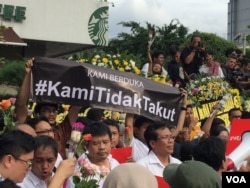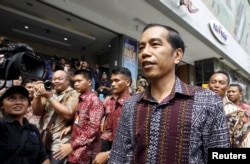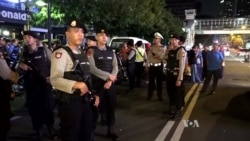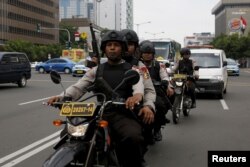A suspected terrorist was killed and at least two others arrested Friday, according to Indonesian police, who said they had conducted raids in multiple locations in the wake of the downtown Jakarta fatal attack the previous day.
Some of those who were targeted in the raids, which took place near the capital as well as in West Java and Central Sulawesi, were linked to Islamic State, which has claimed responsibility for Thursday’s violence.
The extent of their connection, if any, to the Jakarta attack was not immediately clear.
One of the perpetrators who died Thursday had previously been arrested for possessing ammunition during a visit to the country by U.S. President Barack Obama, Indonesian national police chief Badrodin Haiti revealed on Friday.
Some countries, including the United States, kept their embassies closed Friday.
Jakarta has mobilized its entire police force to guard the capital a day after the first attack by the Islamic State group in the world’s most populous Muslim nation.
Angry and saddened Indonesians, in touch via social media, quickly formed the group “We are Not Afraid.”
Dozens converged on the attack site 30 hours after the incident, chanting and singing.
There were shouts of “kill the terrorists” and condemnations of their acts as being against God.
Their vigil was quickly surrounded by local and international journalists, blocking two lanes of traffic on busy Thamrin Street.
Police directed vehicles around the peaceful demonstration.
President Joko Widodo sought to soothe jittery merchants in the Sarinah shopping mall adjacent to the attack location.
“There’s no problem. That’s the important thing. It all appears to have returned to normal: the shops, the food stalls and the shopkeepers,” the president declared.
For the relatives of the 31 dead and seriously wounded, things are not back to normal. The wife of an injured Dutch national said she had learned via social media that her husband had been hurt in the attack and left on the street.
Amateur video, shot from a building across the street from the Starbucks coffee shop where the attack began, shows a grenade being thrown, then perpetrators walking toward wounded people on the ground to shoot them shortly before more explosions erupted and police arrived where they engaged in an extended gun battle.
Two civilians died – a Canadian-Algerian dual national and an Indonesian, along with five assailants. Among those injured and currently hospitalized are several Europeans.
Security increased
Despite Thursday’s IS attack in Indonesia, authorities here are gaining praise from security analysts, noting the country has been seeing hundreds of supporters of the terrorist group shuttle between the Southeast Asian nation and Syria.
“The fact they missed one shouldn’t be taken as a massive failure,” said Sidney Jones, director of the Institute for Policy Analysis of Conflict.
Jones, speaking from Singapore, told VOA the arrests made by police in November and December likely meant a significantly smaller casualty count, but that such an attack was inevitable as “there’s been activity brewing for some time.”
As long as the IS networks remain active with aspirational Islamists intent on doing harm in Indonesia, “we will continue to see attempts,” he said.
'Imitate' Paris attacks
While Indonesian authorities contend the attack was meant to “imitate” the coordinated Paris siege on November 15 last year, the first IS attack in Indonesia fell short of that level of carnage.
Analysts theorize that the Jakarta attack on soft targets with a poorly trained small group armed with grenades, homemade bombs and handguns may have been hurried into execution as leaders of rival factions jockey to be recognized as “emir” should IS declare Indonesia as one of its provinces.
"That’s why [Indonesian IS fighter] Bahrun Naim plotted this attack," from Raqqa in Syria, said Jakarta’s police chief Tito Karnavian just hours after the incident.
The Islamic State-linked Aamaq News Agency said the Jakarta attack "targeted foreign nationals and security forces charged with protecting them."
A U.S. counterterrorism official told VOA there was no reason to doubt Islamic State’s claim of responsibility for the attacks.
U.S. military and intelligence officials have been warning the terror group has been placing a greater emphasis on so-called external attacks, devoting more people and resources, using the attacks in Paris that killed 130 people as a model.
'Symptom of the losses'
“It’s definitely a symptom of the losses they’ve been suffering, like in [the Iraqi city of] Ramadi,” a U.S. official told VOA on condition of anonymity.
Watch: Related video
The official said Islamic State has repeatedly shown that when its forces falter at fighting a more conventional style war on the ground, it will shift toward more asymmetric, terrorist tactics, both in Iraq and Syria and elsewhere.
The United States condemned the attacks "in the strongest possible terms." A White House statement said the U.S. will stand by its strategic partnership with Indonesia and "the government of Indonesia as it works to bring those responsible for this barbaric terrorist attack to justice and build a more secure future."
Indonesia is no stranger to acts of terrorism. In recent years, two luxury hotels in Jakarta were hit by separate blasts five minutes apart on July 17, 2009, killing some foreigners. That attack took place nearly four years after coordinated suicide bombings and car blasts at two sites on the resort island of Bali killed more than 20 people, and the 2002 Bali bombings that left more than 200 people dead.
VOA's Pentagon Correspondent Carla Babb, State Department Correspondent Pamela Dockins and National Security Correspondent Jeff Seldin contributed to this report.










